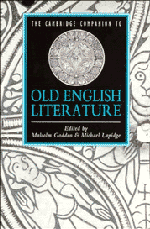Book contents
- Frontmatter
- 1 Anglo-Saxon society and its literature
- 2 The Old English language
- 3 The nature of Old English verse
- 4 The nature of Old English prose
- 5 Germanic legend in Old English literature
- 6 Heroic values and Christian ethics
- 7 Pagan survivals and popular belief
- 8 Beowulf
- 9 Fatalism and the millennium
- 10 Perceptions of transience
- 11 Perceptions of eternity
- 12 Biblical literature
- 13 Biblical literature
- 14 The saintly life in Anglo-Saxon England
- 15 The world of Anglo-Saxon learning
- Further reading
- Index
- Series List
11 - Perceptions of eternity
Published online by Cambridge University Press: 28 May 2006
- Frontmatter
- 1 Anglo-Saxon society and its literature
- 2 The Old English language
- 3 The nature of Old English verse
- 4 The nature of Old English prose
- 5 Germanic legend in Old English literature
- 6 Heroic values and Christian ethics
- 7 Pagan survivals and popular belief
- 8 Beowulf
- 9 Fatalism and the millennium
- 10 Perceptions of transience
- 11 Perceptions of eternity
- 12 Biblical literature
- 13 Biblical literature
- 14 The saintly life in Anglo-Saxon England
- 15 The world of Anglo-Saxon learning
- Further reading
- Index
- Series List
Summary
If in the literature of Anglo-Saxon England there are strong motifs of fatalism about life in this world and a sense of its transience, there is the equally persistent belief that this life prepares one for a more enduring life. At the end of The Seafarer, the speaker declares that wyrd ('what happens') and meotud (God as the ordainer of what happens) are more powerful than anyone's gehygd ('mind', 'thought') and concludes:
Uton we hycgan hwaer we ham agen, ond ϸonne geϸencan hu we ϸider cumen, ond we ϸonne eac tilien, ϸæt we to moten in ϸa ecan eadignesse, ϸser is lif gelong in lufan dryhtnes, hyht in heofonum. ƀæs sy ϸam halgan ϸonc, ϸæt he usic geweorϸade, wuldres ealdor, ece dryhten, in ealle tid. Amen. (The Seafarer 117-24)
Let us reflect where we may get a home and then consider how we might come to it, and then we ought also to strive so that we might come there, into the eternal blessedness, where life is dependent on the love of the Lord, hope in heaven. Thanks be to the holy one because he, the begetter of glory, honoured us, the eternal lord, throughout all time. Amen.
This present, worldly life is passing, but there is hope for a more stable and enduring life. The content of this hope and the forms it took are the subject of this chapter. We shall consider first the major thrust of early medieval eschatology, its focus upon the last judgement and the kingdom of God which the judgement will initiate. Then we may review the lesser motif of expectations concerning the state of the soul between the time of death and the day of judgement.
- Type
- Chapter
- Information
- The Cambridge Companion to Old English Literature , pp. 190 - 205Publisher: Cambridge University PressPrint publication year: 1991
- 1
- Cited by



